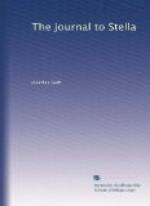29 “This appears to be an interjection of surprise at the length of his journal” (Deane Swift).
30 Matthew Prior, poet and diplomatist, had been deprived of his Commissionership of Trade by the Whigs, but was rewarded for his Tory principles in 1711 by a Commissionership of Customs.
31 “The twentieth parts are 12 pence in the pound paid annually out of all ecclesiastical benefices as they were valued at the Reformation. They amount to about 500 pounds per annum; but are of little or no value to the Queen after the offices and other charges are paid, though of much trouble and vexation to the clergy” (Swift’s “Memorial to Mr. Harley").
32 Charles Mordaunt, the brilliant but erratic Earl of Peterborough, had been engaged for two years, after the unsatisfactory inquiry into his conduct in Spain by the House of Lords in 17O8, in preparing an account of the money he had received and expended. The change of Government brought him relief from his troubles; in November he was made Captain-General of Marines, and in December he was nominated Ambassador Extraordinary to Vienna.
33 Tapped, nudged.
34 I.e., told only to you.
35 Sir Hew Dalrymple (1652-1737), Lord President of the Court of Session, and son of the first Viscount Stair.
36 Robert Benson, a moderate Tory, was made a Lord of the Treasury in August 1710, and Chancellor of the Exchequer in the following June, and was raised to the peerage as Baron Bingley in 1713. He died in 1731.
37 The Smyrna Coffee-house was on the north side of Pall Mall, opposite Marlborough House. In the Tatler (Nos. 10, 78) Steele laughed at the “cluster of wise heads” to be found every evening at the Smyrna; and Goldsmith says that Beau Nash would wait a whole day at a window at the Smyrna, in order to receive a bow from the Prince or the Duchess of Marlborough, and would then look round upon the company for admiration and respect.
38 See Letter 4, note 14.
39 See Letter 5, note 17.
40 An Irish doctor, with whom Swift invested money.
41 Enoch Sterne, Collector of Wicklow and Clerk to the House of Lords in Ireland.
42 Claret.
43 Colonel Ambrose Edgworth, a famous dandy, who is supposed to have been referred to by Steele in No. 246 of the Tatler. Edgworth was the son of Sir John Edgworth, who was made Colonel of a Regiment of Foot in 1689 (Dalton, iii, 59). Ambrose Edgworth was a Captain in the same regiment, but father and son were shortly afterwards turned out of the regiment for dishonest conduct in connection with the soldiers’ clothing. Ambrose was, however, reappointed a Captain in General Eric’s Regiment of Foot in 1691. He served in Spain as Major in Brigadier Gorge’s regiment; was taken prisoner in 1706; and was appointed Lieutenant-Colonel of Colonel Thomas Allen’s Regiment of Foot in 17O7.
44 This volume of Miscellanies in Prose and Verse was published by Morphew in 1711.




